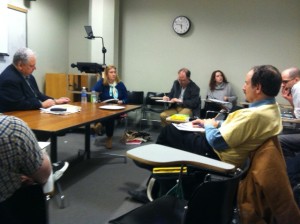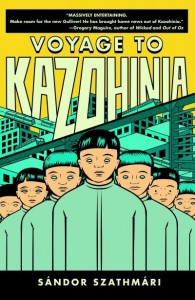Ralph Dumain Guest Blog Post: Reflections on Voyage to Kazohinia Seminar
Wednesday, March 20th, 2013Reflections on the Kazohinia Seminar
By Ralph Dumain
Let me express my gratitude for the opportunity to conduct this seminar on Sándor Szathmári’s Voyage to Kazohinia, my most inspiring experience in several months. I was surprised to see not only interest but so much enthusiasm for Szathmári’s novel among the professors, graduate students, and others who attended, most of whom are at least a generation younger than me and can be assumed to have been raised in a cultural environment with a different set of tacit assumptions than mine, not to mention compared to the social background of classic futuristic and dystopian literature of the half-century preceding my birth. But I should also note that some discussants emphasized how funny they found the novel. I am pleased to see progress in the endeavor to place Szathmári, hitherto unknown in the English-speaking world, into the canon of utopian/dystopian literature. Hungarian literature seems to be unaccountably underrepresented in the literary consciousness of our part of the world, and while English translations of works of many Hungarian authors exist, we owe Esperanto a debt of gratitude as a vehicle for transcultural communication in this regard.
The outline for my ten-minute introduction to the seminar can easily be turned into a publishable piece. Here I will focus on the ensuing discussion taking up the better part of two hours. The dozen participants contributed so many valuable ideas I cannot credit them all individually, but will have to for the most part collectively summarize the most outstanding themes and points made.
There were various comparisons made between Swift’s Gulliver Travels, Huxley’s Brave New World, Kafka’s fiction, several contemporary dystopian novels and Szathmári’s work, as well as comments on common characteristics of the genre of utopian/dystopian literature.
I was asked to comment and fill in some background on Szathmári’s background and perspectives and the relevance of the Esperanto movement. Szathmári was a dedicated Esperantist and internationalist and always destined his writing for an international audience, hence produced his works in both Hungarian and Esperanto. Szathmári harbored quite a bit of idealism coexisting with his unwavering pessimism. I do not have enough information about Szathmári’s overall intellectual background and the range of languages or translations he read in order to make assertions about the philosophical trends to which he was reacting, beyond his satirical references to Hume and Kant. His philosophical perspective remained consistent from the 1930s until the end of his life.
The satire of various nationalisms and empires in the novel, not just Gulliver’s apologetics for the British social order and empire, were pointed out. There certainly is a satire of the capitalist system (in crisis in the 1930s) in the novel, but that does not exonerate in Szathmári’s eyes how the alternative turned out. When queried about this in 1973, the year before his death, Szathmári insisted that his object was not specific social systems, but human nature. In an article published in 1960, Szathmári even denied that material causes were fundamental (as would a Marxist), but rather asserted that human aggression is sui generis.
The question arose in the discussion, as it did in the Esperanto press, as to what extent Szathmári really believed that the Hins represent an ideal society. In the aforementioned interview in 1973, Szathmári insisted that, contrary to others’ claims, Hin society was intended as a positive utopia. Through the decades Szathmári expressed himself repeatedly that we must adapt ourselves to the modern mechanized world, as the instincts and habits that once served survival are now obsolete, but since we are unable to modify them, we are endangering our very existence.
Some questions about Esperanto and the Esperanto movement were also asked. One discussant wondered whether Esperanto itself could be considered an amalgam of science and humanism. While Esperanto has been associated with a range of ideologies and none, it could certainly be said that for Esperanto’s creator Zamenhof, Esperanto’s creation was motivated both by rationalistic and humanistic motives, as was the case for innumerable progressive Jewish intellectuals in the modern world.
Some of the most penetrating observations were brought forth in discussion of the characteristics of the Hins and Behins and in the contrast between the two. One important observation was that while the Hins were anarchistic (while being spontaneously cooperative) and automatically calibrated their actions rationally for the common good completely absent any hierarchy, the Behins were entirely ruled by arbitrary authority. Also noted was the total unpredictability of Behin behavior.
There was a lengthy discussion of the outrageous absurdism of Behin society. While I suggested that the extreme irrationalism of the Behins brought out the rationalistic side of Gulliver, someone else insightfully proposed that Gulliver’s behavior among the Hins was absurd, and that Behin society just presented a different vocabulary for the same notions to be found in Gulliver’s world. (Gulliver of course never recognized the similarity.)
As hilarious as readers found the narrative of the Behins, it is also noteworthy that some found that reading this part of the novel was also such a torturous experience that they were as relieved as Gulliver to return to Hin society. At this point the Hins look pretty good, and they are more conspicuously presented in a positive light. I pointed out the poetic images of Gulliver’s last view of the Hins as he departs on the ocean: a Hin’s outstretched arms to the sun, the Hins swimming in the water thinking to rescue Gulliver . . .
However, before and after this turn in the discussion, various participants questioned the characteristics of the Hins. The Hins were said to have no sense of challenge, limiting themselves to exerting the least effort to accomplish practical tasks. Hins do not understand the motivations of others, and the question is, what motivation do they have to do anything? In the modification of their make-up in the course of evolution, which human traits could or should have survived, and which not?
Much later in the discussion, I questioned the strict utilitarianism of the Hins. What is wrong with pleasure for pleasure’s sake, as befits organic beings? Why is sex, which seems rather perfunctory, still linked with reproduction? Other discussants picked up on this issue, questioning the consistency, viability, and assumptions of the Hins’ brand of rationalism.
While there is no body of relevant critical literature in English, and I do not know whatever criticism can be found in Hungarian, I do know most of the critical literature in Esperanto. I summarized several critiques of Szathmári’s work in Esperanto, of the whole schema and particularly of the notions embodied in the Hins. The most frequent criticisms levied are the strict biologism and undialectical perspective. As I indicated in my introduction, the handling of contradictions and the unresolved questions on the nature of organic beings are taken to a logical conclusion in Szathmári’s 1963 novella Maŝinmondo (Esperanto, meaning “Machine World”), in which the evolution of an intelligent machine-driven world leads to the extinction of all organic life. Several seminar participants expressed their eagerness for me to translate this work into English.
One interesting and important point offered that I had not considered is that while neither of the extremes presented in Kazohinia work for us, neither does moderation, neither does the middle ground. What is then the alternative? It then occurred to me that Gulliver, being British, probably does represent the middle ground of the time, as the Brits’ stereotypical representation is the very epitome of moderation. And so with this satire, the indictment of civilization as we know it leaves no one out.
With regard to relations between the sexes, I pointed out that Gulliver’s final crisis in both Hin and Behin society is precipitated by his encounter with a woman.
Another novel topic introduced by others was the question of custom and causality, made in association with the philosophy of David Hume. There were differing opinions on this. Some took the position that the Behins were entirely ruled by custom, but others, stressing the Behins’ randomness and the Hins’ sense of appropriateness, argued that the Hins are the ones who abide by custom. Kant was also introduced into the discussion. The Hins are born as they are, they do not learn. They could be considered incarnations of the Kantian categorical imperative. I found this interchange interesting also because Hume and Kant are two philosophers satirized in the novel.
I initiated a discussion of C. P. Snow’s notion of the “two cultures.” I also brought up J. D. Bernal’s 1929 transhumanist vision and its possible impact, mentioning also an article contrasting Bernal with Max Horkheimer’s critical theory. I posed a question to the participants: what other works in the utopian/dystopian genre display the sort of dichotomy I outlined in Kazohinia? Several discussants offered a number of examples, which I will have to follow up on. But I was more convinced by Carrie Hintz’s comment that Kazohinia yields not only contrasts, but the clearest example of a dichotomy that she has ever seen. While Francesco Crocco suggested that most utopias incorporate dichotomies, he agreed with my claim that the Hins are an embodiment of positivism as a total way of life. These reactions are very important to me because the dichotomy I see in Kazohinia is one I see running through the modern history of ideas and is central to my own project, and I cannot remember encountering another fictional work that so clearly and outstandingly expresses this dichotomy.
By now you should have a glimpse of why the participants in this seminar were so excited by this novel. Carrie referred to it as a thought experiment. Making your own readerly Voyage to Kazohinia, you will find yourself thinking through the most fundamental philosophical and existential questions. Let us then proceed to advance the incorporation of this Hungarian Esperantist writer into the mainstream of futuristic, utopian, and speculative fiction studies.
—
Read more on Dumain’s blog here: http://gxirafo.blogspot.com/2013/03/ralph-dumain-leads-seminar-on-voyage-to.html


